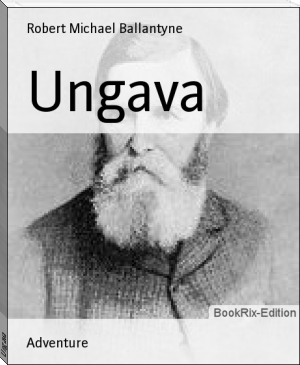Ungava - Robert Michael Ballantyne (distant reading txt) 📗

- Author: Robert Michael Ballantyne
Book online «Ungava - Robert Michael Ballantyne (distant reading txt) 📗». Author Robert Michael Ballantyne
"D'ye think I'm a haythen?" said Bryan, turning away in disgust.
"Ah, try it, Bryan," cried La Roche, turning from an Esquimau baby, in the contemplation of which he had been absorbed--"try it; 'tis ver' goot, I 'sure you. Ver' goot for your complaint, Bryan. But come, here, vitement.--Just regardez dat hinfant. Come here, queek!"
Thus urged, Bryan broke away from his host (who had just split open the shinbone of a deer, and offered him the raw marrow, but without success), and, going towards La Roche, regarded the baby in question. It was a remarkably fine child, seemingly about ten months old, with a round, rosy, oily face, coal-black hair, and large, round, coal-black eyes, with which it returned the stare of the two men with interest. But that which amused the visitors most was a lump of fat or blubber, with a skewer thrust through it, which its mother had given to the child to suck, and which it was endeavouring to thrust down its throat with both hands.
"Come here, Oolibuck; pourquoi is de stick?"
"Ho, ho, ho!" laughed Oolibuck. "Dat is for keep de chile quiet; and de stick is for no let him choke; him no can swallow de stick."
"Musha! but it would stick av he did swallow it," said Bryan, turning away with a laugh.
In the course of the day Stanley and Frank conducted the natives to the fort, and having given them all an excellent dinner and a few gifts of needles, scissors, and knives, led them to the store, where the goods for trade were ranged temptingly on shelves round the walls. A counter encompassed a space around the entrance-door, within which the natives stood and gazed on wealth which, to their unsophisticated minds, seemed a dream of enchantment.
Having given them time to imbibe a conception of the room and its treasures, Stanley addressed them through the interpreter; but as reference to this worthy individual is somewhat hampering, we will discard him forthwith--retaining his style and language, however, for the benefit of his fellow-countrymen.
"Now, you see what useful things I have got here for you; but I cannot give them to you for nothing. They cost us much, and give us much trouble to bring them here. But I will give them for skins and furs and oil, and the tusks of the walrus; and when you go to your friends on the sea-coast, you can tell them to bring skins with them when they come."
"Ye vill do vat you vish. Ye most happy you come. Ye vill hunt very mush, and make your house empty of all dese t'ings if ye can."
"That's well. And now I am in need of boots for my men, and you have a good many, I see; so, if you can spare some of these, we will begin to trade at once."
On hearing this, the natives dispatched several of their number down to the camp, who soon returned laden with boots. These boots are most useful articles. They are neatly made of sealskin, the feet or soles being of walrus hide, and perfectly waterproof. They are invaluable to those who have to walk much in ice-cold water or among moist snow, as is the case in those regions during spring and autumn. In winter the frost completely does away with all moisture, so that the Indian moccasin is better at that season than the Esquimau boot.
For these boots, and a few articles of native clothing, Stanley paid the natives at the rates of the regular tariff throughout the country; and this rate was so much beyond the poor Esquimau estimate of the relative value of boots and goods, that they would gladly have given all the boots and coats they possessed for what they received as the value of one pair.
Overjoyed at their good fortune, and laden with treasure, they returned to their camp to feast, and to sing the praises of the _Kublunat_, as they termed the fur-traders.
CHAPTER TWENTY ONE.
SILENT CONVERSATION--RAW FOOD--FEMALE TAILS--A TERRIBLE BATTLE TERMINATED BY THE INTERPOSITION OF A GIANT.
Of all the people at Fort Chimo no one was more interested in the Esquimaux than little Edith. She not only went fearlessly among them, and bestowed upon them every trinket she possessed, but, in her childlike desire for the companionship and sympathy of human beings of her own age and sex, she took forcible possession of two little girls who happened to be cleaner, and, therefore, prettier than the others, and led them away to her own ravine, where she introduced them to her favourite berries and to her dog Chimo. At first the dog did not seem to relish the intrusion of these new favourites, but seeing that they did not induce his mistress to caress him less than before, he considerately tolerated them. Besides, the Esquimaux had brought their dogs along with them; and Chimo, being of an amicable disposition, had entered into social fellowship with his own kind. We have said that Chimo was sagacious, and it is quite possible he may have felt the propriety of granting to Edith that liberty which he undoubtedly claimed for himself.
But Edith's intercourse with her little Esquimau _protegees_ was necessarily confined to looks--the language of the eye making up for the absence of that of the tongue. There were many things, however, in which language was not required as a medium of communication between the children. When the berries were good, the brightening eyes and smacking lips spoke a language common to all the human race. So, also, when the berries were sour or bitter, the expression of their faces was peculiarly emphatic. The joyous shout, too, as they discovered a new scene that pleased their eyes, while they roved hand in hand through the ravines, or the shrinking glance of fear as they found themselves unexpectedly on the edge of a precipice, was sufficiently intelligible to the trio. The little friends presented a striking and grotesque contrast. It would have been difficult to say whether the little Esquimaux were boys or girls. If anything, the costume seemed more to indicate the former than the latter. Like their mothers, they wore loose deerskin shirts with the hair on the outside, which gave them a round, soft, burly appearance--an appearance which was increased by their little boots, which were outrageously wide, and quite as long as their legs. The frocks or shirts had hoods and tails, which latter, according to fashion, were so long that they trailed on the ground. The inconvenience of the tail is so great that the women, while travelling on a journey, get rid of it by drawing it between their legs, and, lifting up the end, fastening it in front to a button sewed to their frock for the purpose. In travelling, therefore, Esquimau women seem to be destitute of this appendage; but, on arriving at camp, they undo the fastening, and walk about with flowing tails behind them!
Edith's costume consisted of a short frock made of dark blue cloth, and a head-dress peculiar to the Indian women among the Crees. It was preferred by the little wearer to all other styles of bonnet, on account of the ease with which it could be thrown off and on. She also wore ornamented leggings and moccasins. Altogether, with her graceful figure, flaxen curls, and picturesque costume, she presented a strong contrast to the fat, dark, hairy little creatures who followed her by brook and bush and precipice the livelong day.
One morning, about two weeks after the arrival of the Esquimaux, Edith went down to the camp after breakfast, and found her two companions engaged in concluding their morning meal. The elder, whose name was Arnalooa, was peering with earnest scrutiny into the depths of a marrowbone, from which she had already extracted a large proportion of the raw material. The younger, Okatook, seized a lump of raw seal's flesh, as Edith entered their hut, and, cutting therefrom a savoury morsel, put it into her mouth as she rose to welcome her visitor.
"Oh! how _can_ you?" said Edith, with a look of disgust at this ravenous conduct on the part of her friend. But Edith had said, "Oh! how _can_ you?" and "Oh! shocking!" and "Oh! why don't you give up eating it raw?" and "Oh! why _won't_ you have it cooked?" nearly every day for the last two weeks, without producing any other effect than a gleeful laugh from the little Esquimaux; for, although they did not comprehend her words, they clearly understood her looks of disapproval. But although they would not give up the habit of eating raw flesh, which they had been accustomed to from their infancy, they were prevailed on so far to break through the habits of their people as to wash their hands and faces before going out to play. This they did because Edith positively refused to go with them unless they did so.
Lifting up the end of her tail and wiping her mouth therewith, Arnalooa smiled at Edith's look of reproach, and ran laughing towards the shore, where she and Okatook washed their hands, after which they followed Edith and Chimo to their favourite ravine. Although she knew that they did not understand a word of what she said, Edith invariably kept up a running fire of small talk, in reference chiefly to the objects of nature by which they were surrounded. To this the little hairy creatures listened intently with smiling faces, and sometimes they laughed prodigiously, as though they understood what was said, so that their companion felt as if she were really conversing with them, although she was sadly perplexed at the utter impossibility of obtaining an intelligible reply to a question when she chanced to put one.
"Oh, what a lovely glen!" cried Edith, her eyes beaming with delight, as, on turning the point of a projecting crag, she and her companions found themselves in a spot which they had not before seen during their rambles. It was a wild, savage gorge, full of fallen rocks, hemmed in with high cliffs, fringed here and there with willows and mosses, among which were a few brilliant wild-flowers. The lights and shadows of the spot were thrown into powerful contrast by a gleam of sunshine which flashed down among the rugged masses, lighting up peaks and sharp edges in some spots, while in others they were thrown into the profoundest gloom.
"Oh! is it not a delightful place?" cried Edith, as she bounded up the rugged path, followed by Chimo, while the two Esquimau girls buttoned up their tails, and followed her as fast as their more cumbrous habiliments would permit.
For a quarter of an hour the party toiled up the steep ascent, pausing now and then to pluck a flower, or to look back on the wild path by which they had come, until they reached a ridge of rock, beyond which lay a small lake or pool. So dark and still did it lie within the shadow of the overhanging cliffs that it resembled a pool of ink. Here the adventurous explorers sat down to recover breath, and to gaze in childish delight, not unmixed with awe, at the wild scene around them.
The peculiar wildness of the spot seemed to exercise an unusual influence over the dog; for, instead of lying down, as it was wont to do, at the feet of its young mistress, it moved about





Comments (0)